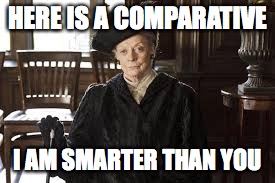Memome for everyone – practising comparatives

You know I like activities requiring as little preparation as possible (no, I have never been a lazy teacher, I just need time to plan taking over the world). One of the areas that needed much preparation is explaining comparatives and superlatives, especially when the only language you’re using in the classroom is English, and you don’t want to translate the adjectives – you’d rather make your students create mental images of the English words.
I used to prepare some pictures that I could use to present the adjectives along with their comparative and superlative forms, but when it comes to some words, their meaning is quite arbitrary – like beautiful, bad or happy.
The internet somewhat helps, but sometimes you can’t trust it…

When a friendly neighbourhood Teacher’s Corner introduced a new game called Memome, I thought oh, it’s basically just a typical memo activity. And to be honest, I was right… but it turns out to be much more versatile. First things first, though: what is Memome?
A set of 30 illustrated cardboard cards with 15 English adjectives and 15 corresponding comparatives. It comes with an instruction how to play memo and basically you’re ready to use it. Simple? Definitely, yet you may use it in various ways!
Treasure hunt for kids

The thing that I like most about Memome is that it’s made of nice, thick cardboard, which means you can use the cards in various games and they won’t get destroyed in those clammy paws of our youngest students. For a while now I’ve been observing lessons for children and I must admit that quite a lot of teachers don’t let them move as much as they need to.
Memome can be a great solution here, because all you need to do is to hide all the comparative cards in your classroom, divide your students into groups, give them the cards with the basic forms and ask them to find the corresponding cards somewhere in the classroom. The group that finds their set first is the winner. Simple, easy and makes kids have fun – they love treasure hunts.
15 questions contest for teens

One might think illustrated cards won’t be useful when working with teenagers – which is nonsense, as teenagers will accept literally anything that will give them an opportunity to banter with one another. So the activity goes like this:
- Divide students into groups
- Distribute 15 random cards evenly among the groups.
- Ask them 15 questions revising grammar or vocabulary. The group that answers first (and correctly) gets another random card from the remaining ones.
- Once you run out of cards, each group has to make pairs of adjectives and their comparative forms. If they have matching cards – great! If not, they will have to make a sentence with a missing adjective (in its missing form) to replace the card.
- The group that finishes first wins.
It’s a simple activity, but it makes your students revise, communicate and have fun at the same time.
Philosophical statements for adults

I find Paolo Coelho and similar coaching-style mottoes an invaluable source of inspiration in my classroom. First, they are usually simply silly (one of the reasons they’re so hard to forget). I’m sure you know what I’m talking about, your Facebook wall is probably full of your friends posting stuff like this:
…and today is another chance to fail, thanks!
Do you see my idea for the exercise? Ask your adult students to practice basic and comparative forms by drawing two random cards and making a motivational quotes a’la Paolo Coelho. You know, like taking bigger and more beautiful and transforming them into:
The bigger the tears on your face, the more beautiful my grave is.
or something like this
You may divide your students into groups, give them dictionaries and observe the chaotic flood of hilarious quotes!
But wait! There is more! make your own superlatives!
As you can see, simple 30 cards can be used in various activities… but since there are only comparative forms here, you may encourage your students to come up with their superlative forms. With children, I could do a project when they make some extra cards by themselves. With teenagers and adults, I would probably use some sentence-building, like:
Anna was the youngest in her family until her younger sister was born, however, they died young as their parents didn’t vaccinate them.
the end
Anyhow, I’m sure you’ll have fun with Memome.
Enjoy!
I received this product for free, courtesy of IceBreaker.










Leave a Reply
Want to join the discussion?Feel free to contribute!